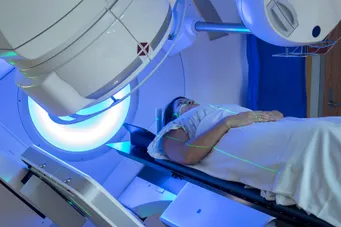[MUSIC PLAYING]
DR. JOHN WHYTE: Welcome,
everyone.
I'm Doctor John Whyte, the Chief
Medical Officer at WebMD.
Metastatic breast cancer
is the most advanced form
of breast cancer.
More than 170,000 people are
currently living
with metastatic breast cancer.
But in recent years, there's
been some advancements.
So to help unpack the latest
data, I've asked two experts
to join me.
Dr. Claudine Isaacs
is the Director of the Clinical
Breast Cancer Program
at the Lombardi Comprehensive
Cancer Center
at Georgetown University.
And Dr. Kathleen Harden.
She's the Director of the Breast
Medical Oncology Program
at Inova Schar Cancer Institute.
Doctors, thanks for joining me.
DR. CLAUDINE ISAACS: Thank you
for having us.
DR. JOHN WHYTE: Well, let's
start off, so we're all
on the same page.
What do we mean
by metastatic breast cancer?
What does that mean to you
and your patients, Dr. Isaacs?
DR. CLAUDINE ISAACS: So
metastatic breast cancer really
refers to breast cancer that has
spread to a distant site.
So this is breast cancer that
has spread beyond the breast
and the lymph nodes
on the same side.
So the typical sites that we
think about our liver, bone,
lungs, brain
are the typical sites that we
think of when we're talking
about metastatic breast cancer.
DR. JOHN WHYTE: And Dr. Harnden,
who's most likely impacted?
Do we know either by type
of breast cancer
or presentation?
And men can also be affected as
well, can't they?
DR. KATHLEEN HARNDEN: Yes.
So we certainly see some men,
unfortunately,
with metastatic breast cancer.
Women by far make up
the vast majority
of metastatic breast cancer
cases.
And women with a history
of early stage breast cancer
are certainly the highest
proportion of those that we see.
The highest risk breast cancer
subtypes
are triple negative breast
cancer and previously
HER2-positive breast cancer.
Although advances in that field
have really decreased their risk
of having a metastatic or spread
recurrence.
Estrogen receptor positive
or hormone receptor
positive breast cancer
is still the most common.
So the vast majority
of our metastatic breast cancer
patients,
estrogen-fueled or
estrogen-driven breast cancer.
DR. JOHN WHYTE: And then
do we know what the signs
and symptoms are
of metastatic breast cancer?
Do patients present differently
or is it patients typically that
have presented and then
chemotherapy has failed
and it become metastatic?
DR. CLAUDINE ISAACS: So what I
typically say to them is,
they have symptoms that are
persistent and non-improving.
So it could be a cough, it could
be pain,
and
without any clear precipitate.
But it's persisting for more
than two weeks and not getting
better or really getting worse
to contact us.
We prefer to know about it
and then we'll watch it
and we'll decide whether we want
to do imaging.
But we really just want to make
our patients aware of it,
but also not kind of crazy.
Right?
Because they are still going
to get the normal stuff and it's
important to tell them
that they're still going to hurt
their back
and still going to do
those things.
DR. JOHN WHYTE: I mentioned
at the beginning
that we've had advancements
in treatment
over the last few years.
For you Dr. Isaacs, how do you
think through what the treatment
regimen is going to be when
a patient has metastatic breast
cancer?
DR. CLAUDINE ISAACS: Well, one
of the very important things
is first of all
to figure out what subtype
of breast cancer they have.
And typically, we know that
from their original diagnosis.
But typically what we do is we
biopsy
a side of metastatic disease
to A, confirm that it is indeed
metastatic breast cancer,
and then B, to re-look
at the receptor status,
because our treatment is very
much predicated
on the characteristics
of the tumor.
And then for certain breast
cancer subtypes, we also want
to send additional testing,
either something that can be
done, the routine pathology
lab like PD-L1 testing
to determine
whether immunotherapy is
indicated or sent out
for molecular profiling
to help guide our treatment.
But our treatment is really
focused if they have hormone
receptor positive HER2-negative,
we're going down
a certain pathway.
They have triple-negative,
we go down another one.
If they have HER2-positive,
we go down the third pathway.
So that's how we're generally
guided in terms
of our recommendations.
DR. JOHN WHYTE: And let's talk
about some of the therapies
because they are targeted,
and that's very different
than years ago when we have
a limited armamentarium.
So how is the field of treatment
for metastatic breast cancer
changed even
over the last few years?
DR. KATHLEEN HARNDEN:
So the field
of metastatic breast cancer
has completely changed almost
every few years.
In the last decade or two,
I feel like we are always
keeping up with the latest
and greatest breakthrough
treatments, and each treatment
that comes to market
seems to make larger and larger
advances in the field.
In the field
of triple negative breast
cancer, some of our greatest,
newer treatments are the advent
of immunotherapy
in triple-negative breast cancer
for patients who have PD-L1
positivity, which means
on the outside of their breast
cancer cell, they have a marker
or a receptor.
It's like an arm sticking
outside of their breast cancer
cell
that's able to evade
their own immune system
from identifying their cancer.
So we have treatments that can
block that hidden way
of those breast cancer cells
moving around the body.
And then we also have
new targeted treatments
in triple-negative breast cancer
like sacituzumab.
Additionally in HER2-positive
breast cancer,
we have new treatments that
combine a chemotherapy
or a payload, as we call it,
with an antibody.
So it finds its way
to the proper cell and deposits
the treatment inside the breast
cancer cell like a smart bomb.
DR. JOHN WHYTE: And Dr. Isaacs,
given the armamentarium that you
have,
how do you think
through with the patient what's
the best therapy?
Is most of it
routinized in terms of what you
give or you really think through
with the patient based on let's
be practical,
there are risks and benefits
of any type
of therapeutic intervention?
DR. CLAUDINE ISAACS:
So absolutely.
We think it
through on an individual basis.
And I think you used a term
earlier on the breast cancer
journey.
And I really think
of metastatic disease
as being a journey.
The good news about breast
cancer is that we have a lot
of treatment options,
even for the different subtypes.
And there's often
multiple choices of things that
would be very
appropriate to think about.
So we do tend to very much
individualize it based
on the patient.
What has her prior treatment
been?
How has she tolerated water
or other comorbidities?
What are her preferences?
We have oral drugs, sometimes
it might be preferable.
So we really do try
and individualize it.
And it's often not a choice
between A or B.
But is do I do A first or B
or do I do it the other way
around?
And that could depend on
whether she is planning
to go to the beach
and spend a month at the beach
with her family.
So it is very much
an individualized treatment.
And what we're really trying
to do is afford our patients
the best quality of life,
as they define it,
for as long
as possible with the various
treatment options
that we have available.
DR. JOHN WHYTE: Dr. Hardin, what
do we know about survival
benefit
in patients
with metastatic breast cancer?
Let's be honest, when people
hear that term,
it's very alarming and jarring
to them.
What's the latest data
on five-year survival?
DR. KATHLEEN HARNDEN:
So five-year survival
in the metastatic breast cancer
world really depends on what
type of breast cancer you have.
And then in addition to that,
how well the breast cancer
responds in an individual
to the treatments
we're utilizing.
So we can look back two decades.
And many women
with metastatic breast cancer
that was
triple-negative or HER2-positive
survived for less than a year.
And now we see women,
particularly
in the HER2-positive setting who
can survive on average eight
or more years with treatments
that are much less
toxic than what we use to offer.
Additionally
in the estrogen positive
metastatic breast cancer
setting, those women are living
longer and better with more
and more treatments that prevent
them from needing chemotherapy
for longer.
In the triple-negative breast
cancer setting,
we are hopeful that
immunotherapy is substantially
improving survival.
We have some studies that show
that we are doubling survival
in patients who are eligible for
or would respond
to immunotherapy.
So there's a lot of hope
on the horizon,
and women are living
and men are living longer
and longer
with metastatic breast cancer.
DR. JOHN WHYTE: Well Dr. Isaacs,
I'm going to go back
to that journey term
that you liked.
So what do you tell patients who
are diagnosed
with metastatic breast cancer?
What does that journey look like
for them?
DR. CLAUDINE ISAACS: So
I typically tell them when we
talk about treatment
for metastatic breast cancer,
we're talking
about indefinite treatment.
It'll be different treatments.
And we talk about making
choices.
I say, you know, we're going
to make the best choice
at this time for the treatment
that you're going to get right
now based on the characteristics
of your tumor based
on prior therapies,
all of the things
that we talked about before.
And at some point, the treatment
that I have you on
will stop working.
That doesn't mean that it never
worked, but it will stop working
at some point.
And I can't define that point.
I try and give them an average,
particularly if they ask for it
so they can plan because I think
that's important.
But I say then at the next time
point, we'll relook at things,
we'll reevaluate,
and we'll think
about the next therapies.
So I think it's really
important, I think,
to frame it for them that we are
talking
about continuous therapy.
DR. JOHN WHYTE: And then Dr.
Harnden, you mentioned
that treatment seems to change
every two years.
So I'm going to put you
on the spot.
What does treatment look
like in two years from now?
What's on the horizon?
DR. KATHLEEN HARNDEN: That is
a fantastic question.
I think that I am most hopeful
that we truly find ways to allow
someone's own body to detect
and take care
of their own cancer on a basis
where we are able to take
someone off of what we now
consider treatment
and allow for their body
to really continue to fight
the fight for us
in a way that is sustainable.
Now, of course, that's
sort of a longer term goal
probably than two years.
But I think some of the most
exciting things on the horizon
are that we're getting better
and better
at detecting why cancers are
able to grow
around the treatment, what
levers are those cancer
cells using that we can then
leverage against it?
And so having more
mutational targeted therapies.
Really having those work better
than they work now.
Having more individualized basis
of treating people.
So I hope in the next two years,
we're able to take subtypes
like triple-negative breast
cancer
and break it down into really
the different categories
that it is.
Triple-negative breast cancer
became a subtype because it was
sort of the not A, not B,
therefore, C category.
So it's not hormone-driven,
it's not HER2-positive or HER2-
positive.
Therefore, it's triple-negative.
And I think that's really a bin
of individuals who have very
different types of breast
cancer.
So my hope is that we're
able to break that down better
and we're able to leverage
mutations in the tumor to work
for us, as well as leveraging
someone's immune system
or other mechanisms
within the body to fight off
their breast cancer.
DR. CLAUDINE ISAACS: I think
Dr. Harnden gave a really
comprehensive and thoughtful
answer.
The one thing that I want
to just add
is that the importance
of clinical trials,
because clinical trials have
gotten us to the advances
that we are at today.
So all of these new drugs
that we have available
are really based on yesterday's
trials.
And what we really want to be
doing
is developing new treatments,
and we're only going to be
able to figure that out
within clinical trials.
DR. JOHN WHYTE: Dr. Isaacs,
let's acknowledge the elephant
in the room, the COVID pandemic.
I want to ask you,
how has the pandemic impacted
the way
we diagnose, treat, and manage
people with metastatic breast
cancer?
DR. CLAUDINE ISAACS: It has been
an interesting journey.
And I think the past year
and a half, it's really changed
how we've looked at things.
Although I think we've gone back
closer to where we were.
We've learned how to treat
people and how to think safely.
I think, obviously, the vaccine
has made a huge difference
for our patients.
And the recent recommendation
for booster shots
for our oncology patients
has really changed things.
I think we look
at our treatments
and think about their side
effects and put them in context
in a little bit different light.
But I do feel that we are
in a very different place
than we were, for instance,
in April 2020.
So I think there, we were really
putting the brakes on things.
And we were so worried
about everything that we were
doing.
And I think what we've
discovered is that we can
continue treatment,
and we can do it safely.
And we are again trying
to re-initiate that and not
impact our patient's
long-term livelihood because
of COVID.
DR. JOHN WHYTE: Dr. Harnden,
I want to give you
an opportunity to talk
to viewers who have been
diagnosed with metastatic breast
cancer or maybe it's a family
member or loved one watching
this program, what's
your message to them?
DR. KATHLEEN HARNDEN: It's
a great question.
I think that the most important
part of the journey for most
individuals is feeling that they
have the support of their family
and friends and their greater
network
to make the decisions that are
right for them
at that moment in time.
And so being that source
of support, being a listening
ear,
and being a part
of their journey
where you enable them to feel
comfortable to make
an individualized decision
that's right for them
without feeling
undue pressure
and other directions.
I think for women and men
actually facing
metastatic breast cancer know
that there is a lot of hope
that people individually and as
a group
continue to outlive and outlast
our greatest expectations
that people continue to do
fantastically well
with the latest and greatest
treatments.
And that clinical trials
are on an everyday basis
establishing new breakthroughs
for us
in the field
of metastatic breast cancer.
DR. JOHN WHYTE: Well, Dr.
Isaacs, Dr. Harnden,
I want to thank you both
for taking the time,
as I mentioned at the beginning,
to help unpack what
is the latest information
about diagnosis and treatment
of metastatic breast cancer.
As you both point out,
it's important to make sure you
get the best care, to have
a good relationship
with the physician
and ask questions, and make
sure they're aware of what's
on your mind.
Thanks for watching.
DR. CLAUDINE ISAACS: Thank you.
DR. KATHLEEN HARNDEN: Thank you.
[MUSIC PLAYING]













